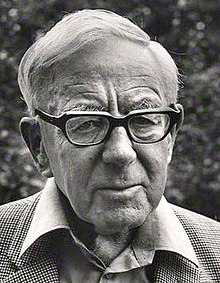A. J. P. Taylor
|
A. J. P. Taylor FBA |
|
|---|---|

Taylor in 1977
|
|
| Born |
Alan John Percivale Taylor 25 March 1906 Birkdale, Lancashire, England |
| Died |
7 September 1990 (aged 84) London, England |
| Nationality | English |
| Citizenship | British |
| Alma mater | Oriel College, Oxford |
| Occupation | Historian |
| Spouse(s) |
|
| Awards | Fellow of the British Academy |
Alan John Percivale Taylor FBA (25 March 1906 – 7 September 1990) was an English historian who specialised in 19th- and 20th-century European diplomacy. Both a journalist and a broadcaster, he became well known to millions through his television lectures. His combination of academic rigour and popular appeal led the historian Richard Overy to describe him as "the Macaulay of our age".
Taylor was born in 1906 in Birkdale near Southport, which was then part of Lancashire. His wealthy parents held left-wing views, which he inherited. Both his parents were pacifists who vocally opposed the First World War, and sent their son to Quaker schools as a way of protesting against the war. He was educated at various Quaker schools including Bootham School in York. Geoffrey Barraclough, a contemporary at Bootham School, remembered Taylor as "a most arresting, stimulating, vital personality, violently anti-bourgeois and anti-Christian". In 1924, he went to Oriel College, Oxford, to study modern history.
In the 1920s, Taylor's mother, Constance, was a member of the Comintern while one of his uncles was a founding member of the Communist Party of Great Britain. Constance was a suffragette, feminist, and advocate of free love who practised her teachings via a string of extramarital affairs, most notably with Henry Sara, a communist who in many ways became Taylor's surrogate father. Taylor has mentioned in his reminiscences that his mother was domineering, but his father enjoyed exasperating her by following his own ways. Taylor had a close relationship with his father, and enjoyed his father's quirkiness. Taylor himself was recruited into the Communist Party of Great Britain by a friend of the family, the military historian Tom Wintringham, while at Oriel; a member from 1924 to 1926, he broke with the Party over what he considered to be its ineffective stand during the 1926 General Strike. After leaving, he was an ardent supporter of the Labour Party for the rest of his life, remaining a member for over sixty years. Despite his break with the Communist Party, he visited the Soviet Union in 1925, and again in 1934.
...
Wikipedia
